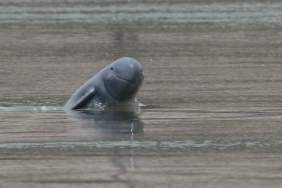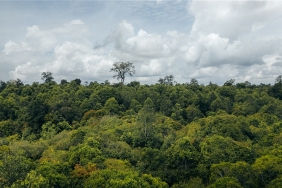PRESERVATION OF FOREST RESOURCES THROUGH POLICY TRANSFORMATION STRATEGIES
Indonesia's tropical forests with their rich biodiversity are national assets that, if managed properly and preserved, will be able to support the needs of human life and development. However, the sustainability of Indonesia's tropical forests faces serious threats from deforestation and climate change, not to mention that the utilization of forest ecosystem wealth tends to be wasteful and destructive. Recognizing that the government's ability to conserve forest resources is still quite weak, only through appropriate transformation strategies can conservation efforts sustainably benefit human life in Indonesia.
This was conveyed by Prof. Dr. Ir. Hadi S. Alikodra, M.S., Senior Advisor for Biodiversity and Wildlife Management of WWF Indonesia, when delivering his Scientific Oration as Professor of Bogor Agricultural University (IPB) on Wednesday, May 13, 2015. The paper delivered by Prof. Alikodra who is a Permanent Professor of the Faculty of Forestry of IPB on the occasion was entitled "Transformation of Forest Resources Conservation for the Sustainability of the Nation".
Prof. Alikodra reminded that in the future, forests will be more valuable as providers of ecosystem services rather than just providers of goods such as timber. Ecosystem services include benefits obtained directly (provisioning), from natural processes (regulation), basic ecological functions and ecological processes of forest ecosystems (supporting), and human links with ecosystems (cultural).
Reflecting on the green economy policy approach to curb the rate of natural resource degradation that turned out to be insufficient, Prof. Alikodra emphasized the need to develop a conservation business that carries the blue economy by also implementing the notion of ecosophy. Other factors considered to determine the transformation strategy include: considering the cultural potential of the nation and indigenous peoples, intervention and implementation of conservation practices outside the usual business, changes in forest management policies and international cooperation.
Responding to the Scientific Oration, Dr. Efransjah, CEO of WWF Indonesia said, "Prof. Alikodra's thoughts that we heard today are a compass for all parties who will contribute to conservation efforts to preserve Indonesia's rich forest resources."
Dr. Efransjah continued, "Prof. Alikodra captures the face of Indonesia's tropical forests from various directions carefully to then remind us of the ability of forests to provide benefits for human life, but more importantly emphasizes the importance of appropriate and impactful transformation efforts based on the understanding of ecosophy."





